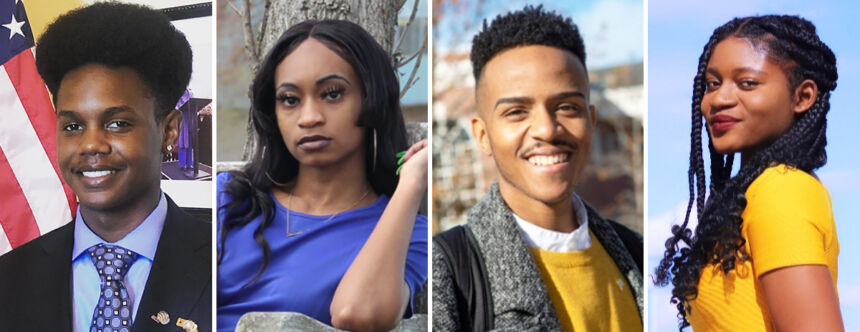October 07, 2021
New Black student group supports diversity in International Affairs

UNIVERSITY PARK, Pa. – Students at the Penn State School of International Affairs (SIA) have created a new organization, the Black Student Association (BSA), in order to help recruit, retain and support Black students at SIA and, more broadly, in the field of international affairs.
Each of the four founding members— Schönn Franklin, Jasmine Green, Shaheed Soligné, and Elizabeth Turay—are master’s degree candidates in the SIA Class of 2022 and bring a wide range of experiences to their work with BSA.
Soligné, who serves as the inaugural BSA president, is also the assembly delegate for SIA in the Graduate and Professional Student Association (GPSA), a U.S. Army veteran, member of the Sigma Iota Rho International Studies Honor Society, and a current Thomas R. Pickering Foreign Affairs Fellow.
“Sometimes you see a need or an absence of an organization and the part of me that was in the military stepped out to take charge once I saw the need for an organization like the Black Student Association,” Soligné said. “I’m honored to serve as president for this association and I want to build a presence on campus and in the community because some of the issues that we face in SIA are also school wide, so we want to create that support and collaboration.”
Eleanor Brown, professor of law and international affairs at SIA and Penn State Law in University Park and a senior scientist at the Rock Ethics Institute, is serving as faculty advisor for BSA.
“I was once in these students' shoes myself—a Black student with a particular interest in international affairs," Brown said. "I understand the critical importance of an affinity group, and I was delighted when the students asked me if I would consider being their advisor.”
Some of the goals of BSA include:
- Providing outreach, mentoring, and resources to current and incoming students;
- Increasing fellowship and intellectual engagement through guest speakers and other events;
- Building and strengthening networks among past, present, and future Black students at SIA and in the international affairs field; and
- Working with SIA faculty and staff to address any issues that may arise that affect Black students.
Turay, who was born and raised in Sierra Leone, serves as BSA’s vice president and is also an SIA peer mentor, student ambassador, SIA outreach coordinator for the Human Rights Society, and vice president and treasurer for the Mindfulness and Wellness Society. She said that the group hopes to foster a stronger feeling of “connectedness” among Black students at SIA.
“Black people are not well represented in the field of international affairs, and so we created this group in order to listen, support each other, and elevate each other,” Turay said. “We are here to inspire and push each other to new heights in our community because there are other people who are going through the same struggles.”
The connection that the four co-founders developed with each other after their arrival at SIA was one of the driving forces behind the group’s creation.
“BSA’s formation came out of a sense of camaraderie,” said Franklin, who serves as BSA treasurer, is the current president and former judicial chair of GPSA, and a Charles B. Rangel Graduate Fellow. “We are a resource to any student who feels like they don’t have a voice at SIA, and we have a great relationship with faculty and staff so we hope to keep those lines of communication open to be able to address any concerns directly with them.”
Green, who is BSA’s secretary, president of the SIA Student Government Association (SGA), student ambassador, and member of Sigma Gamma Rho Sorority, Incorporated, similarly emphasized the importance of creating safe spaces for Black students and making them feel comfortable within the local community.
“The world is changing and Black students are affected by that, so we need more Black students to have a say in what’s happening here and in the community because of our different perspectives,” Green said. “One of our big things is to make our community better and stronger and show that Black students belong here and that we need more of them in the field of international affairs.”
Across the United States, including in higher education, racism, bias, and discrimination experienced by students of color are not new issues.
“I’ve seen a lot of improvements from SIA and Penn State as a whole to address the issues of racism and discrimination, but it takes organizations like this to work to change behaviors by actions,” Soligné said. “The statements released have been great, but now it’s about action.”
Soligné added that he hopes groups such as the BSA can help to “channel positive solutions from negative events.”
“It is very necessary not only at Penn State but in the greater State College community because of the racial gaps,” he said. “All students have the ability to create change and take action, and it starts with one movement or person to get it going—but takes more to continue the efforts.”
That sense of making a difference and working toward a better future resonated in the voices of all the BSA founders.
“I didn’t have Black mentors when I came here and now we have the opportunity to make lifelong connections for students,” Green said. “We are continuing to educate ourselves as we go so when we leave here, we are not only ready to take on the world, but have the confidence to do so.”
To stay up to date on BSA, follow its Instagram for more information.
